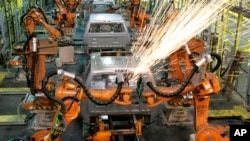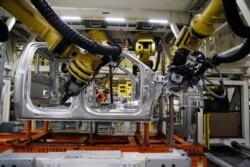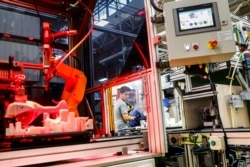The use of robots in the U.S. workplace more than doubled from 2009 to 2017, the bulk of them in manufacturing. But the extent of manufacturing job losses in the Midwest was masked by the economic boom of the past 10 years.
“A growing economy independent of technology, independent of robotics, has been able to absorb, at least at the national level ... people who may have gotten displaced,” said William M. Rodgers III, professor of public policy and chief economist at the Heldrich Center for Workforce Development at Rutgers University.
Rodgers co-authored a report on how robots are affecting workers and their wages.
While robots haven’t had a nationwide impact on the employment rate, some states in the Midwest have twice as many robots as all other regions and are suffering as a result of the rise of robotization.
Michigan, Ohio, Indiana, Illinois and Wisconsin have the highest concentration of robots, primarily in manufacturing.
These industrial robots tend to perform repetitive tasks, such as assembly and packaging, or sealing, welding and painting, at a very fast rate.
The workers most affected by the machine takeover are young, less-educated people, with black men and women experiencing the greatest job losses. Those who find new jobs in different industries often have to settle for lower pay.
“If the displacement is large enough, if they get pushed into retail or they get pushed into hospitality and leisure, the supply of them in that industry or that sector increases,” Rodgers said. “And if demand for workers is not growing fast enough, you begin to see a decline in wages.”
The regions with the most robots overall include:
1. Los Angeles-Long Beach-Santa Ana, California
2. Chicago-Naperville-Joliet, Illinois
3. Houston-Baytown-Sugar Land, Texas
4. Phoenix-Mesa-Scottsdale, Arizona
5. Detroit-Warren-Dearborn, Michigan
6. Milwaukee-Waukesha-West Allis, Wisconsin
7. Philadelphia-Camden-Wilmington, Pennsylvania/New Jersey/Delaware/Maryland
8. San Jose-Sunnyvale-Santa Clara, California
9. Indianapolis, Indiana
10. Cleveland-Elyria, Ohio
The good news is that these displaced workers could ultimately end up in higher-paid positions, if the right safety nets are put into place.
“Approaches that can help cushion the blow for people who do get displaced by technology,” Rodgers says, “and then also to have education and training programs that allow individuals who do lose their jobs to be able to transition to other occupations.”
Rodgers says now is the time to prepare for the rise of the robots.
“What better time to be able to help people who are getting bullied, so to speak, by technology or getting bullied, so to speak, by globalization?” Rodgers says. “Times of prosperity is the best time... to invest in all Americans.”






